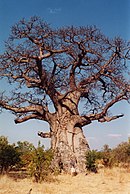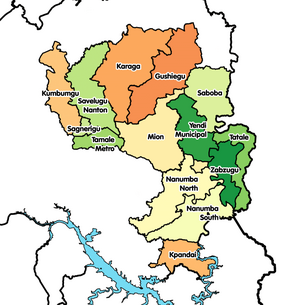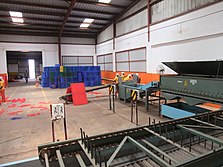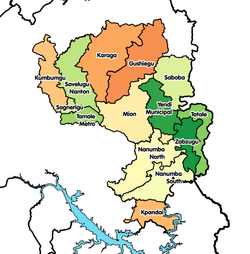Northern Region (Ghana)
This article may require cleanup to meet Wikipedia's quality standards. The specific problem is: Layout is confusing, WP:N issues in some sections (Tourism, Health facilities, Notable citizens), POV issues in places (especially Business section), and encyclopedic style problems throughout. (September 2023) |
Northern Region | |
|---|---|
 Tamale Stadium | |
 Location of Northern Region in Ghana | |
| Country | Ghana |
| Capital | Tamale |
| Districts | 16 |
| Government | |
| • Regional Minister | Salifu Saeed[1] |
| Area | |
• Total | 25,448 km2 (9,826 sq mi) |
| Population (2021 Census) | |
• Total | 2,310,939 |
| • Density | 91/km2 (240/sq mi) |
| GDP (PPP) | |
| • Year | 2013 |
| • Per capita | $5,150 |
| GDP (Nominal) | |
| • Year | 2018 |
| • Per capita | $2,500 |
| Time zone | GMT |
| Area code | 037 |
| ISO 3166 code | GH-NP |
| HDI (2021) | 0.539[3] low · 10th |
The Northern Region is one of the sixteen regions of Ghana.[4] It is situated in the northern part of the country and ranks as the second largest of the sixteen regions. Before its division, it covered an area of 25,000 square kilometres, representing 10 percent of Ghana's area. In December 2018, the Savannah Region and North East Region were created from it. The Northern Region is divided into 16 districts. The region's capital is Tamale, Ghana's third largest city.[2]
Geography and climate
[edit]Location and size
[edit]The Northern Region, spanning approximately 25,000 square kilometers, stands as Ghana's Second largest region by land area. It shares borders with the North East Region and Savannah Region to the north, and Oti Regions to the south, and neighboring countries, including the Republic of Togo to the east and La Cote d'voire to the west.[5]
Climate and vegetation
[edit]
The Northern Region has a Guinean forest-savanna mosaic ecosystem. The Guinea Savanna is the wettest of the three savanna ecological zones. The vegetation consists predominantly of woodlands and grasslands. The wet season is between April and October, while the dry season occurs from January to March. There is an average annual rainfall of 750 to 1050 mm (30 to 40 inches). The highest temperatures are reached in March, at the end of the dry season. From late November to March, the north east trade winds blows causing Harmattan.[6] During this time, temperatures can vary between 14 °C (59 °F) at night and 40 °C (104 °F) during the day.
Economy
[edit]Like all parts of Ghana, more than half of the economically active population are agricultural. The region is one of the most agriculturally important regions in Ghana. It also has the largest reserve of iron ore.
Demographics
[edit]The Northern Region contains much of the territories of the Kingdom of Dagbon and Dagbani is the most widely spoke language,[7] along with English. Dagbani belongs to the Oti–Volta subfamily in the Niger–Congo language family. Other languages spoken within the region include Likpakpaln and Nawuri.
Business
[edit]
The region is a hotspot for investment in Ghana, with Tamale previously been ranked as the fastest growing city in West Africa; experiencing tremendous growth compared to other cities in Ghana.[8] The region's location, and greater proximity to both Europe and North Africa, compared to Accra, makes it an increasingly attractive destination for investors. Ghana's largest iron ore reserves, estimated to be more than three billion tons,[9] makes the region an ideal destination for investments in steel and iron.
Tourism
[edit]- Naa Gbewaa Palace, Yendi
- Hamamat Shea Butter Village
- Tamale Center for Culture and Arts
- Savanna Centre for Contemporary Art
- Red Clay Studios
- Nkrumah Volini
- Nuku Studios
- Saakpuli Slave wells
- Diarre Napagaduungbanani
- Naa Binbegu Boabab Tree, Yendi
- Buntaga Irrigation Dam
- Sabali (River Oti)
- Nawuni River (White Volta)
- Deutsch Cemetery at Yendi
- Adibo dalila war zones, Adibo
Religion
[edit]Around three out of five residents in the Northern region were affiliated to Islam (60.0%).[10]
Districts
[edit]
The Northern Region of Ghana contains 16 districts. 11 are ordinary districts in addition to 1 metropolitan and 4 municipal districts.:[11] Under every municipality, metropoly and districts are many towns and villages.
| # | District | Capital | Population |
|---|---|---|---|
| 1 | Gushegu | Gushegu | |
| 2 | Karaga | Karaga | |
| 3 | Kpandai | Kpandai | 108,816 |
| 4 | Kumbungu | Kumbungu | |
| 5 | Mion | Sang | |
| 6 | Nanton | Nanton | |
| 7 | Nanumba North | Bimbilla | |
| 8 | Nanumba South | Wulensi | |
| 9 | Saboba[12] | Saboba | |
| 10 | Sagnarigu | Sagnerigu | |
| 11 | Savelugu | Savelugu | |
| 12 | Tamale Metropolitan | Tamale | |
| 13 | Tatale Sangule | Tatale | |
| 14 | Tolon | Tolon | |
| 15 | Yendi Municipal District | Yendi | |
| 16 | Zabzugu | Zabzugu |
Health facilities
[edit]
Hospitals in the Northern Region:[13]
- Tamale Teaching Hospital
- Tamale Central West Hospital
- Tamale West Hospital
- SDA Hospital
- Yendi Municipal Hospital
- Savelugu Municipal Hospital
- Bimbilla District Hospital
- Kumbungu District Hospital
- Gusheigu District Hospital
Notable citizens
[edit]| # | Citizen | Settlement |
|---|---|---|
| 1 | Aliu Mahama | Yendi |
| 2 | Wakaso | Tamale |
| 3 | Majeed Waris | Tamale |
| 4 | Haruna Iddrisu | Tamale |
| 5 | Muhammad Mumuni | Kumbungu |
| 6 | Ramatu Baba | Yendi |
| 7 | Abubakari Sadiq NAM | Yendi |
| 8 | Sheikh Ibrahim Basha | Tamale |
| 9 | Sheikh Sa-eed Abubakar | Tamale |
!scope=row | 10 |Hajia Samata Gifty Bukari |Yendi |-
See also
[edit]References
[edit]- ^ "Regional Ministers - Government of Ghana". ghana.gov.gh. Archived from the original on 4 July 2017. Retrieved 23 March 2018.
- ^ a b "Northern Region". GhanaDistricts.com. Archived from the original on 2010-02-11. Retrieved 2009-11-20.
- ^ "Sub-national HDI - Area Database - Global Data Lab". hdi.globaldatalab.org. Retrieved 2018-09-13.
- ^ "No new Covid-19 cases in Northern Region in 3 weeks - MyJoyOnline.com". MyJoyOnline. Retrieved 2021-05-18.
- ^ Mutuku, Ryan (2021-01-25). "The Northern Region districts and their capitals in Ghana". Yen.com.gh - Ghana news. Retrieved 2024-02-26.
- ^ Lyngsie, G.; Awadzi, T.; Breuning-Madsen, H. (2011-11-01). "Origin of Harmattan dust settled in Northern Ghana — Long transported or local dust?". Geoderma. 167–168: 351–359. doi:10.1016/j.geoderma.2011.07.026. ISSN 0016-7061.
- ^ "Learn Dagbanli (Dagbanli Bɔhimbu) → What Is The Dagbanli Language? - Learn Dagbanli | Learn Dagbani". Retrieved 2023-02-04.
- ^ "Tamale is the fastest growing city in West Africa - Tamale in Ghana". independent-travellers.com. Retrieved 2023-02-04.
- ^ "N/R: Over 1.7bn tonnes of iron ore discovered in Yendi Municipality- Majority Leader". Prime News Ghana. 2019-05-15. Retrieved 2023-02-04.
- ^ "Table 4.17: Population by religious affiliation and region, 2010" (PDF). Archived from the original (PDF) on 2018-07-12. Retrieved 2018-07-17.
- ^ "Northern". GhanaDistricts.com. Archived from the original on 18 January 2013. Retrieved 15 January 2013.
- ^ "Victims of land conflict in Saboba district pick up their pieces - MyJoyOnline.com". MyJoyOnline. Retrieved 2021-05-18.
- ^ "HEALTH FACILITIES IN NORTHERN REGION IN SHAMBLES...Tamale Hospital worst affected". Modern Ghana. Retrieved 2021-11-23.
- "Districts of Ghana". Statoids.
- GhanaDistricts.com



